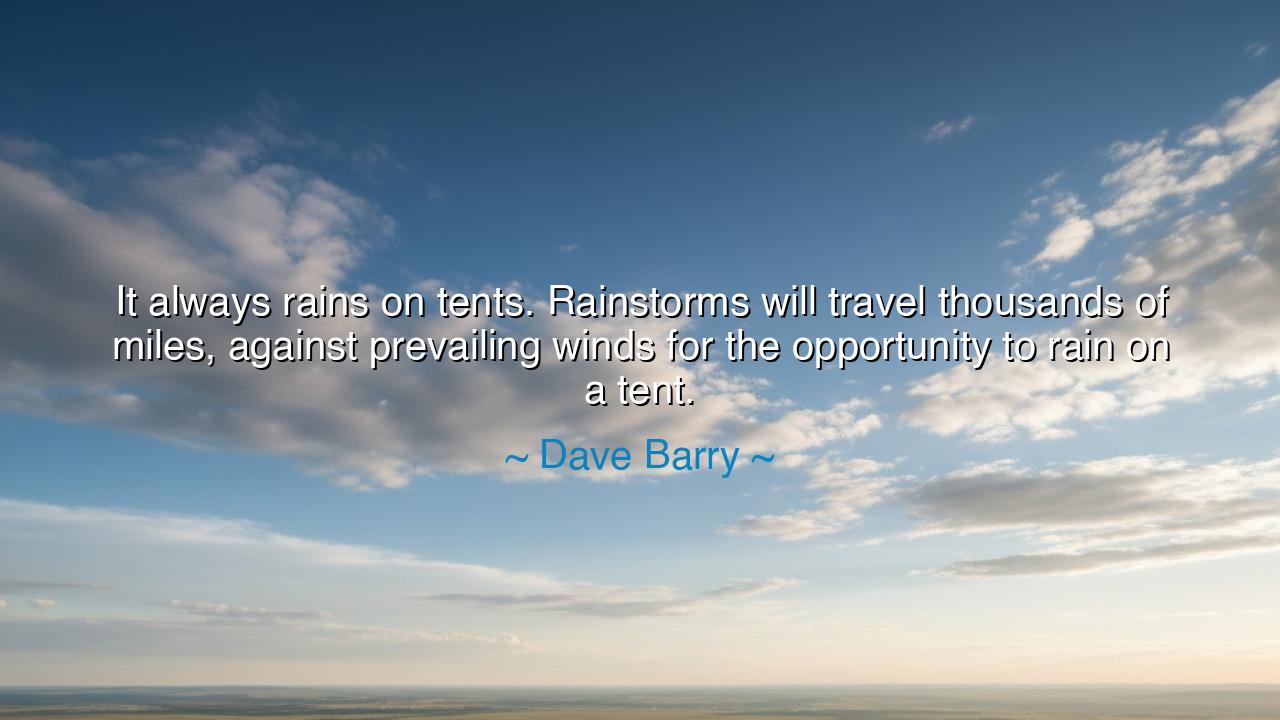
It always rains on tents. Rainstorms will travel thousands of
It always rains on tents. Rainstorms will travel thousands of miles, against prevailing winds for the opportunity to rain on a tent.






In the words of Dave Barry: “It always rains on tents. Rainstorms will travel thousands of miles, against prevailing winds for the opportunity to rain on a tent.” Though spoken with humor, these words carry a deeper wisdom. They reveal the timeless truth that in human life, trials often come when we are least prepared. Just as the fragile canvas of a tent seems to call forth the storm, so too does vulnerability attract hardship. Yet within this irony lies the ancient teaching: adversity is not an intruder but a companion, summoned to test our endurance and deepen our spirit.
The origin of this thought is as old as the wanderer’s road. For travelers, soldiers, and pilgrims, the tent has always been a symbol of impermanence, a fragile shelter against the vastness of nature. To dwell in a tent is to admit exposure, to acknowledge that the walls between comfort and chaos are thin. Rain upon the tent becomes a parable of life itself: whenever we build something temporary, whenever we step into the uncertain, the storm will find us. It is not cruelty, but a reminder of how small we are and how resilient we must become.
History bears witness to this truth. Consider the armies of Julius Caesar, who camped beneath canvas while the heavens lashed them with storms. The rain did not wait for marble palaces or stone fortresses—it sought out the soldier’s tent, humbling the legions of Rome. Or recall the pilgrims who crossed oceans to find new lands, only to huddle beneath leaking roofs as tempests raged above. Each drop of rain was a lesson that greatness is not forged in ease but in the endurance of discomfort.
Barry’s humor hides a universal observation: difficulties often arrive with uncanny timing, as though the storms of life seek out our weakness. When money is scarce, expenses arise. When courage wavers, fear appears. When we feel unprepared, fate delivers its test. It is as if the universe conspires to remind us that no tent is waterproof forever, no life immune from hardship. Yet this is not meant to break us. It is meant to awaken within us the fire of adaptability, the discipline to prepare, and the humility to endure.
The deeper meaning is that rain upon the tent is not merely an inconvenience—it is a call to resilience. The wise do not curse the storm; they strengthen the ropes, dig the trenches, and endure until morning. In the same way, when life’s storms descend, the wise do not ask, “Why me?” but “How shall I endure, and what shall I learn?” For the tent is not meant to be a fortress; it is meant to be a teacher, reminding us that security is fleeting but character endures.
The lesson for us is clear: expect the rain. Do not be surprised when challenges come, for they will always come—sometimes from afar, sometimes against all reason, like storms crossing oceans to find a single tent. Instead of despairing, prepare yourself. Strengthen your mind as you would your shelter. Welcome adversity as a teacher rather than an enemy. For the storm will always come, but whether it leaves you broken or stronger depends on how you meet it.
In practice, this means living with both humor and resolve. Laugh, as Barry does, at the absurdity of life’s timing, but also take the lesson to heart: storms will come, so be ready. When you set up your tent—whether it is a fragile plan, a new venture, or a season of life—do not forget the storm clouds that gather unseen. Prepare for them, endure them, and when the rain passes, you will find yourself not diminished but fortified.
Thus, Dave Barry’s jest becomes a teaching of the ancients: life rains on the tents of the living, but those who endure the storm emerge wiser, humbler, and stronger. Do not fear the storm, for it seeks you not to destroy but to shape you. And when the rain falls upon your tent, let it remind you that every drop, though cold and unwelcome, is also a baptism into the resilience of the human spirit.






AAdministratorAdministrator
Welcome, honored guests. Please leave a comment, we will respond soon